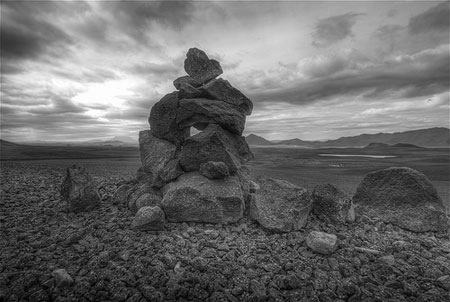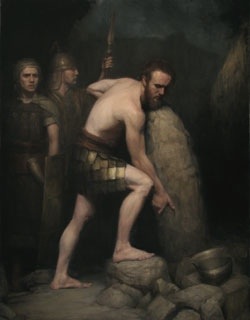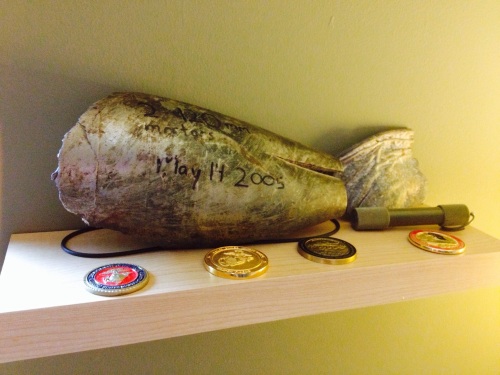
I hate the cold, but I love the holiday season. For me “the holidays” start a few weeks before Thanksgiving with Veteran’s Day. One of the things I love most about the military is the richness of tradition and symbolism. It’s built into our uniforms. It’s part of the rigid environment of customs and courtesies. We learn our branch’s history with a sense of pride as if we somehow took part in those events. Symbolism is everywhere in the military.
Every holiday season I inevitably hear someone say (with just enough pretentious piety to warrant an eye roll) something along the lines of, “I don’t need a holiday to remind me to be thankful.” Or, “It’s such a shame most people need a holiday to think of Jesus.” But if we don’t focus our intentions into something specific we tend to become less mindful of things over time. Remembering/commemorating/memorializing really significant things is so important, but human nature is to forget. And that’s why we have things like Veteran’s Day and Thanksgiving, to help us be intentional about remembering and honoring.
The Bible is absolutely drenched with the idea of intentionally remembering meaningful things. According to God’s law every year at Passover God’s people were to sit down as families and eat a very specific meal that reenacted the night God delivered the Jews from Egypt. During the Feast of Tabernacles they were to actually live in tents for a week to remember how God took care of them in the wilderness after Egypt. Tons of other festivals and feasts were instituted to remember certain things. Also, as you read the Bible you notice how insanely often people and places are renamed in order to remember significant things. That town’s name was changed to this because this happened there. And then you take into account all the times a really phenomenal event happens and someone builds an altar, or erects a monument in that spot. On and on it goes. The point is, God is a big fan of intentionally remembering significant things.
I think many Christians, mostly in the evangelical arm of Protestantism, have lost sight of the power of remembering through symbols and monuments. The reality is the scriptures direct believers to employ symbols and traditions to remember the most important parts of faith. To make tangible the invisible things we believe, if only for a moment. Virtually all believers are familiar with at least two of these symbols.
Communal symbols
These are symbols that all believers are called to embrace and take part in.
1. Baptism. When you come to faith in Jesus you express an unseen spiritual reality through the symbol of baptism. In Acts 2:38 Peter, preaching the first Christian sermon, directs them to “repent and be baptized, everyone of you…” In baptism we reenact the reality that Jesus died, was buried then came up out of the grave. More than that, though, we are making a statement that we are somehow joined with him in this. Romans 6:3-5 Or don’t you know that all of us who were baptized into Christ Jesus were baptized into his death? We were therefore buried with him, through baptism, into death in order that, just as Christ was raised from the dead through the glory of the Father, we too may live a new life.
2. Communion. This is to be an ongoing way that we remember Jesus. In fact, when Jesus was instituting this tradition in the upper room he said explicitly, “Do this in remembrance of me.” In 1 Corinthians 11 Paul said that with communion we are proclaiming the Lord’s death until he returns. This is something we do as a family, as the church, as a community of believers. When we come together we remember Jesus through the symbols of the bread and cup.
Those are some of the communal symbols we share with all believers. But I’ve been thinking a lot lately about the idea of the individual symbol. The personal monument.
The Personal Monument
I want to share a really obscure story from the Old Testament with you. It’s in 1 Samuel 7. The main guy on the scene is the prophet Samuel. Israel has been serving idols for a while, and then there is a deep, nation-wide turning to God. Samuel says, “If you guys are really serious about returning to God, then get rid of all the idols and false gods. In fact, everyone should get together at the city called Mizpah and we’ll all repent and pray and fast together there” (I’m paraphrasing). So they go. The Philistines find out and say, “Hey, the entire Israelite army is in one place and they haven’t eaten anything for a while, so they’re tired and weak. Let’s go be bad guys to them and kill them there.” (Also not a literal translation).
The Israelites find out the Philistines are coming, panic and say, “Samuel! Pray for us!” Samuel prays and God causes a great panic and confusion among the Philistines. They end up just slashing at each other until they run away and Israel wins. Hooray. This is the important part. 1 Samuel 7:12 Afterwards, Samuel took a stone and set it upright between Mizpah and Shen. He named it Ebenezer, explaining, “The Lord has helped us to this point.”
Such a peculiar passage. Such an odd name. In our context when we hear Ebenezer most of us immediately think of Scrooge right? And I remember in Bible college hearing this odd old hymn “Come Thou Fount”, which has this line “Here I raise mine Ebenezer, hither by thy help I come.” So, what’s that about?
Ebenezer (Eben-ha-neser) literally means “Stone of the help”.
The point is this: God does this truly amazing thing and Samuel responds by putting a marker there. This isn’t a ceremony that all Jews are to take part in. This is something he did to help him remember, to memorialize this great event, to commemorate God’s help, so that every time he looked at the “stone of the help” he would recall how God came through.

I love Samuel’s explanation. “Up to this point God has helped us.” There is such a beautiful realism and heavy theology in that statement. That explanation implies I don’t know what God will do with me tomorrow. God may allow the Philistines to win tomorrow. But, up to this point God has helped us.
So my question for you today is this: We all share one baptism, and we all share the same communion, but what is your Ebenezer? There should be something(s) in your life that trigger memories of God’s faithfulness. Things that help you own a faith that says I don’t know what God has for me tomorrow, but up to this point he’s been faithful.
How many times have we experienced some blessing and we think, “This is awesome. I’ll never forget this!” Then a few months later we are back in panic mode wondering will God come through? Is he able? Does he care? Does he answer prayer? In those moments we need an Ebenezer.
What does an Ebenezer look like? I don’t want you to think I’m promoting any type of idol worship, or faith infused items, or even the kind of icons that some branches of Christianity hold to. I’m just talking about something that helps you remember. It looks like the anniversary of an event. It looks like sharing your faith and your testimony with others. It looks like a blog post in which you tell the story of what God has done. It looks like a copy of a large donation check that sits under the glass on a desk at a local Christian youth center. It looks like anything that prompts you to remember.

Here is one of mine. This chunk of metal is an Ebenezer. It’s a piece of a 120mm mortar that was half of a roadside bomb that hit my vehicle in Iraq. My vehicle was directly hit by IEDs on several occasions and each time my crew and I walked away without a scratch. This chunk is from the first one. It sits on a shelf in my office. I don’t pray to it. It doesn’t extend grace or faith to me. It’s just a hunk of metal. But every time I look at it, I remember.
Happy Thanksgiving. Merry Christmas.
